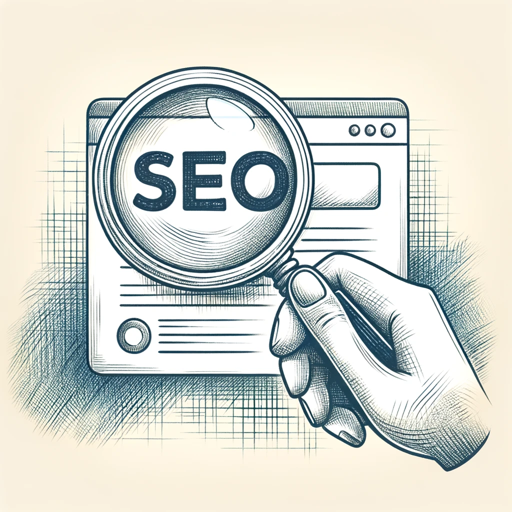search engine marketing - Efficient SEM Strategy

Hello! Ready to enhance SSO Storage's online presence.
Amplify Your Online Presence with AI-Powered SEM
Write a product description for a new storage unit.
Create a meta description for a storage box.
Suggest SEO improvements for a product page.
Explain how to use AIOSEO for product optimization.
Get Embed Code
Understanding Search Engine Marketing
Search Engine Marketing (SEM) encompasses a range of strategies and tactics used to increase visibility and traffic to websites through search engines. It combines the power of search engine optimization (SEO), which involves optimizing website content and structure to rank higher in organic search results, with the effectiveness of pay-per-click (PPC) advertising, where advertisers pay a fee each time one of their ads is clicked. SEM aims to enhance online presence, drive targeted traffic, and improve conversion rates. For example, a local bakery might use SEM to appear at the top of search results for 'best chocolate cake near me' through both SEO efforts in content optimization and PPC campaigns targeting specific keywords related to their products. Powered by ChatGPT-4o。

Core Functions of Search Engine Marketing
Keyword Research
Example
Identifying the most effective keywords for SEO and PPC campaigns.
Scenario
A small e-commerce store uses keyword research tools to find high-volume, low-competition keywords to optimize their product listings and ads, resulting in increased visibility and sales.
SEO Optimization
Example
Improving website content and technical structure to rank higher in organic search results.
Scenario
A blog focused on sustainable living implements on-page SEO by optimizing their articles with relevant keywords, improving site speed, and earning backlinks, significantly boosting their organic traffic over time.
PPC Advertising
Example
Creating and managing ads to appear in search engine sponsored results.
Scenario
A legal firm sets up a PPC campaign targeting specific keywords related to their services. They craft compelling ad copy and landing pages, leading to a higher click-through rate and more client inquiries.
Performance Analysis
Example
Measuring the effectiveness of SEM strategies and making data-driven decisions.
Scenario
An online retailer analyzes their SEM campaign performance using analytics tools, identifying which keywords and ads have the highest conversion rates and adjusting their strategy accordingly to maximize ROI.
Who Benefits from Search Engine Marketing
E-commerce Businesses
Online retailers can leverage SEM to drive targeted traffic to their product pages, improve conversions, and increase sales by appearing prominently in search results for relevant queries.
Local Service Providers
Businesses offering local services, such as plumbers, dentists, or restaurants, can benefit from SEM by targeting local keywords, ensuring they appear to potential customers searching for their services in the area.
Content Creators and Bloggers
By optimizing content for search engines and targeting specific keywords, bloggers can increase their visibility, attract a larger audience, and potentially monetize their traffic through ads and sponsorships.
Large Corporations
With larger budgets, corporations can utilize both SEO and PPC strategies extensively to dominate search engine results pages (SERPs) for industry-relevant keywords, enhancing brand visibility and authority.

How to Utilize Search Engine Marketing Effectively
Begin with a Free Trial
Start by visiting yeschat.ai to sign up for a free trial without the need for login credentials or a ChatGPT Plus subscription.
Identify Your Goals
Define clear, measurable goals for your search engine marketing (SEM) campaign, such as increasing website traffic, generating leads, or boosting sales.
Research Keywords
Conduct thorough keyword research to identify terms and phrases your target audience uses when searching for products or services like yours.
Create Compelling Content
Develop high-quality, engaging content that incorporates your targeted keywords. This includes website content, blog posts, and ads.
Monitor and Adjust
Regularly review your SEM campaign's performance using analytics tools. Adjust your strategies based on data to optimize results.
Try other advanced and practical GPTs
seo optimisation
Optimize effortlessly with AI-powered SEO.

search optimization
Powering Your Content with AI

Decrypted Smart Contract Creator
AI-Powered Solidity Contract Creation

Ramen Bowl Designer
Craft Your Dream Ramen Bowl

The Sabotage Strategist
Turning Mundane into Fun with AI

Decentralized Finance Insighter
Unlocking DeFi Insights with AI

轻断食助手
Personalize your fasting journey with AI

Stock Market Coach GPT
Empowering Your Trading Journey with AI

Keyframe Buddy
Animating the Web, AI-Enhanced

Tech Companion
Solve Windows issues with AI-powered assistance.

OshoGPT
Enlightenment through AI-powered Osho Wisdom

CatGPT
Deciphering Meows, Enriching Bonds

FAQs About Search Engine Marketing
What is search engine marketing?
Search engine marketing (SEM) is a digital marketing strategy used to increase a website's visibility in search engine results pages (SERPs) through paid advertising and organic search tactics.
How does SEM differ from SEO?
While SEM involves both paid and organic strategies to boost website visibility, SEO focuses exclusively on optimizing content and website structure to rank higher in organic search results.
What are the benefits of SEM?
SEM offers immediate visibility in search results, targeted advertising to reach potential customers, measurable ROI, and the ability to easily adjust campaigns for optimization.
What are common SEM platforms?
Google Ads and Bing Ads are among the most popular platforms for SEM, offering tools for creating and managing pay-per-click (PPC) advertising campaigns.
How can I improve my SEM campaigns?
Improving SEM campaigns involves regular keyword research, refining ad copy, optimizing landing pages, adjusting bids, and analyzing performance data to inform adjustments.
